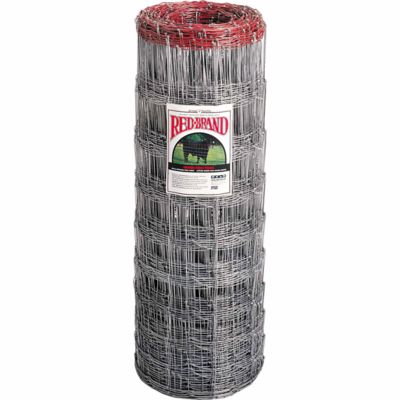Titan Attachments 60 in Clamp on Pallet Forks Heavy Duty with Adjustable Stabilizer Bar for Loader Buckets, Skid Steer Buckets Easy to Install
The Titan clamp on pallet forks slide over the cutting edge of the your bucket and clamp down, locking the unit in place.
-
$164.99
$395.00 -
Red Brand Woven Field Fence, 330 ft. L x 47 in. H, 70048 at Tractor Supply Co.
Rated 4.88 out of 516Red Brand Woven Field Fence, 330 ft. L x 47 in. H, 70048 at Tractor Supply Co.
Rated 4.88 out of 516





TRANSPORT GOODS WITH EASE: Skip the heavy lifting and let your tractor do the work! Our pallet forks make it easier to move and transport hefty items. These pallet forks allow you to haul logs, lumber, and firewood. You can also move fence posts. Use these pallet forks to clear debris and brush as well as move hay bales. The versatility of our pallet forks is endless. Order today.ADJUSTABLE SPREADER BAR: It can be irritating when your forks spread too far apart because it makes picking up bales or logs more difficult. With our adjustable stabilizer bar, this issue won’t be a problem. The bar conveniently prevents your forks from spreading apart. Our stabilizer bar can be adjusted from 29” to 44”. Just use the width adjustment knob to determine your desired distance.COMPATIBLE WITH MOST MOWERS: These pallet forks feature a universal design that is compatible with most lawn tractors, loaders, and mowers. Whether you own a New Holland, Kubota, John Deere, Ford, or another make, these pallet forks will easily clamp on. Just attach the forks to the bucket and you’ll be set to start moving supplies. These pallet forks are an essential piece of farm equipment.SECURE LIFTING: These lightweight pallet forks use chain holes to ensure you’ll get a secure lift, even when dealing with heavy objects. These forks are designed with thick rectangular tube walls. Each fork weighs about 50 lb. Rollback protection slots will keep you and your machinery safe from harm. These forks have a combined weight capacity of 4,000 lbs., so you can carry a wide variety of goods.DIMENSIONS: Our pallet forks have a total length of 60”, with the forks measuring at 43” L x 4” W x 2” H. They allow for a bucket lip gap of 2”. The stabilizer bar adjusts from 29” to 44” within the forks. These forks are designed with thick rectangular tube walls. Each fork weighs about 50 lb. and the forks have a combined weight capacity of 4,000 lbs.



Reviews
There are no reviews yet.